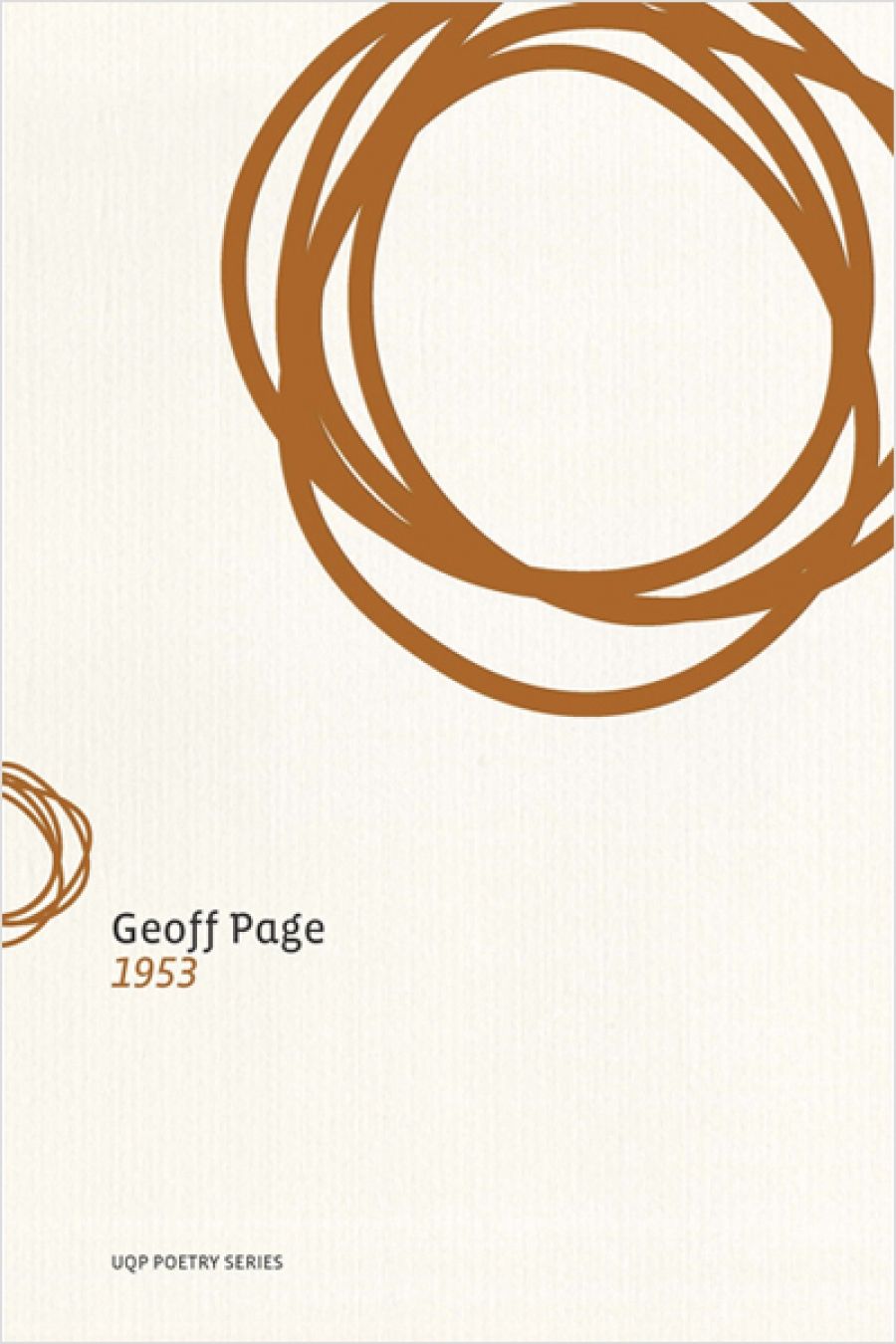
- Free Article: No
- Contents Category: Poetry
- Review Article: Yes
- Online Only: No
- Custom Highlight Text:
Geoff Page’s 1953 is set in the town of Eurandangee, which, we learn, is about 650 kilometres north-west of Sydney ...
- Book 1 Title: 1953
- Book 1 Biblio: University of Queensland Press, $24.95 pb, 120 pp, 9780702249525
The tone of 1953 is familiar from Page’s other historical verse novels: amused, critical, affectionate, cutting, blokey. It seems to come from an older Australia, its satire tempered by forgiveness of human frailty, though still biting enough against institutionalised error. The spoken and unspoken racism which Aborigines experience, and the limited choices available to women of the era, are the particular foci of this book.
The constancy of the iambic verse in 1953 is both a strength and a weakness of the collection. It produces a sense of inexorability; the steady, measured-out sameness of rhythm captures the claustrophobia of the country town’s narrow prospects and proscribed fates. The verse is fluid, vibrant, and easy to read, but occasionally I wanted Page to break out of that four-square metre. To keep the beat, he pads lines with words such as ‘quite’, ‘rather’, ‘of course’, and ‘perhaps’; the result is that he over-uses them. They appear regularly in the character voices as well as that of the narrator, which weakens the distinctiveness of each.
The characters in Eurandangee include Stan the town clerk, Peggy his unfaithful wife, Dr God the GP, Ryan the local copper, Niko the Greek migrant who runs the Paramount Café, and Janene the Aboriginal girl who wants to get ahead in school but is held back by her hard-drinking mother. Also represented are the squattocracy, the small town bourgeoisie, and assorted battlers: the fettler, the shearer, and Auntie May, whose children have been taken by the Protection Board: ‘Twenty years ago last August / they had me running down the platform, / howling in that flannel dress.’
Page’s other verse novels such as The Scarring (1999), Freehold (2005), and Lawrie and Shirley (2006) are plot-driven, but the 2.30 p.m. time constraint precludes that here. What we get are elements of back-story and hints about what is about to happen, though we will never know how it all turns out.
So why 17 February 1953? As far as I can discover, nothing momentous happened that day in Australia. That’s probably Page’s moral – an ordinary day in an ordinary town, with plenty of drama hidden. In February 1953, Churchill was in power in the United Kingdom, Eisenhower in the United States, and Menzies in Australia. In October the year before, Menzies, without bothering to consult his own cabinet, had let the British government explode their first atomic bomb in the Montebello Islands off the coast of Western Australia. The Korean War was about to end. McCarthyism and the Cold War were in full swing. The White Australia policy was beginning to dissolve under waves of new migration.
This is the broader context of 1953 and some of it filters through all the way to Eurandangee. The Korean War has been good for the price of wool; the local gentry drive Daimlers to Sydney. In an inspired stroke, Page lifts us out of the outback town just once to place us in February snow in Korea, as a soldier from Eurandangee watches the enemy ‘white on white’ through binoculars and dreams of summer in his hometown. The local Country Party ‘forty-niner’ tells us café-owner Niko helped him push to outlaw the Communist Party in the referendum. Niko survived the Nazi occupation of Greece but fled the communist partisans in the civil war that followed. He is marooned now in his Paramount Café:
Kythera was rich with myth;
its paddocks, though, were small and stony,
especially for surplus sons.
This town’s an island too at times,
surrounded by its sea of wheat;
All this is rich and vivid, but how relevant is it today, sixty years later? It is interesting to compare 1953 with Australian poetry about contemporary country towns. Coral Hull’s Broken Land came out in 1997 and is set in Brewarrina near where Eurandangee would be. Compared to Page’s book, the climate is drier and hotter, the environment more depleted, the shops empty. The wool farms have gone, replaced by irrigated cotton crops that make the tired old river flow backwards. Michael Sharkey’s collection Another Fine Morning in Paradise (2012) includes the long poem ‘ The Custom of Cockaigne’, which shows us another country town with a perilous economy, environmental degradation, and drug and alcohol abuse. Common themes in all three books are isolation, a precarious relationship to the environment, and the unresolved question of Aboriginal dispossession and all its ramifications. I note the NSW Bureau of Crime Statistics and Research recently rated Bourke the most dangerous town in the state.
Geoff Page was born in Grafton, and would have been thirteen years old in 1953. In this book he recalls with loving detail the country emporium with its ‘flying fox’ for cash transactions, the local cinema, and the town barber shop. There is an element of nostalgia at work here, but this is not merely a sentimental book. The relevance of 1953 is that it shows us what things used to be like in country Australia so that we can measure what’s different and what hasn’t changed.


Comments powered by CComment